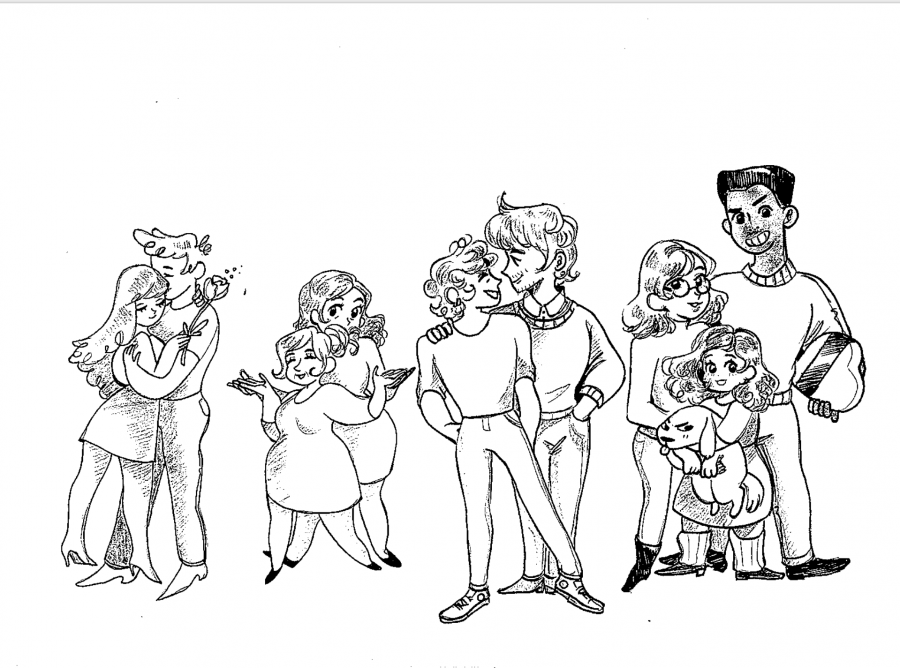Oscar-winning performance shines amidst lackluster film
By Lisa Nault
Staff Writer

Julianne Moore looked beautiful walking up to the stage to receive her Oscar for Best Actress during this year’s Academy Awards ceremony. Her speech was especially moving when she began to talk about Alzheimer’s disease and how people with this disease feel isolated and marginalized. She is a very talented actress and her performance was genuine. However, that does not make “Still Alice” a good film. Warning, there will be a few spoilers mentioned.
“Still Alice,” directed by Richard Glatzer and Wash Westmoreland, is about a linguistics professor who is diagnosed with early-onset Alzheimer’s disease. My main concern with the movie is that the character of Alice is never seen as anyone besides a victim of the disease. In the first scene in the film, Alice sits around a table with her family celebrating her birthday and a thought slips her mind. It only lasts a second, but it is supposed to reveal the early signs of the illness.
The viewers never see her life before the disease, unless you include brief pointless flashbacks she has throughout the film to her as a child on a beach that last for only a couple seconds. How can an audience feel empathy for a character losing who she was if they never saw her before she showed the telling signs? The film tries to make up for this by making you feel sympathy for Alice because of how others around her are reacting to her diagnosis. It does not succeed in this either.
Alice’s family are hardly ever given any screentime to actually convey how they are feeling, with the exception of Lydia (Kristen Stewart). Alice’s son is only given two scenes that involve him and Alice talking about her disease. He is there during the announcement to the family about her diagnosis and the other scene has him sitting in the crowd as Alice gives a speech to others impacted by the disease. The audience does not get to understand how he is dealing with his mother’s disease and how he may feel like he is losing her.
Alice’s other daughter gets a few more scenes to show that she does not know how to deal with the situation, but again, it does not feel like enough.
Alice’s husband John, played by Alec Baldwin, has plenty of screen time to divulge how upset he is with the situation but he never has a real conversation with her about it. He gets frustrated with how the disease is changing her and tries to deny the fact that she is going to be changing. That might have been okay, especially if the film went into it more, but he ends up getting a job and leaving her to the care of Lydia.
He tells Lydia that she is stronger than he is because she is willing to stay with Alice now that the disease is really affecting her. It would be very interesting to have had the camera sit down with him and have him explain how he does not feel he is strong enough to stand by as he emotionally loses his wife. Instead, all the audience gets is him walking out after a quick hug.
The transitions in the film are also forced and make the film move too quickly. Alzheimer’s disease can be very slow and progressive over time but the film could not stand to just take a minute and focus on how the characters feel. Alice shows a few small signs of the disease and the next scene she gets completely lost when jogging. She struggles to come up with words to make in the “Words with Friends” game in one scene and in the next she wets herself because she can’t remember where the bathroom is. The transitions are not this extreme but they feel like they are since each scene only lasts long enough to reveal the state she is in and then moves on.
The last scene is of Lydia reading to Alice now that the disease has taken over and then the credits begin to roll. It feels rushed and unsatisfying. A much better place to end would have been the scene where Alice makes a speech about how the disease has impacted her and how she struggles with it but now lives in the present which makes the audience see the importance that every moment has. It is much more emotional and it would have left the viewers with a message to contemplate when they leave the theater. Instead, audience members leave feeling like there could have been something more.
Despite everything I just mentioned, by far the worst part of the film was the plot line of Alice planning to commit suicide. After her diagnosis, Alice gets pills and hides them in her bureau with a lamp on it, then makes a video for herself to watch in the future. In the video she explains that she made three questions for herself to answer and if one day came where she can’t answer them then she should take the pills.
I understand that the film wants to expose how terrified she is of losing what she finds important in life. She does not want to change into someone who is not her usual self. However, it is done terribly in part because the plan had several chances to fail. What if someone saw the video that was located on her desktop? What if someone found the pills in her drawer when putting away laundry (they said “take all” right on them)? What if the lamp moved and the video instructions became incorrect? There are too many what-ifs to have made this plan actually work.
And when I say the plan worked, I do not mean she actually commits suicide. She doesn’t, though she tries. Alice watches the video and goes upstairs to get the pills and take them. Just before she takes them all, the front door opens as someone comes home and she drops them all on the ground. Now that her mind has focused on something else, she forgets the video and the reason that she was in the bathroom. The scene transitions to the next one.
This is my biggest problem with the plotline. The audience never sees a reaction. The pills are everywhere—why do we not see how her family deals with this event? We never see them talk about it or react to finding the pills. The scene happens and then moves on, expecting the audience to move on as well.
The film should give the audience members some dignity and actually challenge them by showing how people react to something this immense and not treating its viewers as children who want to move on now that they know everything turned out okay. Everything is not okay. The mother and wife of these characters has just tried to commit suicide.
People have emotions and reactions in real life and just because the film created a situation that is difficult to deal with does not mean the film can deem the character’s reactions irrelevant and unnecessary.
The audience deserves to see how the characters would handle such a complex situation. The suicide plotline ended up being used as a device to build suspense that led absolutely nowhere. It was a big letdown because it did not have the decency to allow the other characters to react to Alice’s actions and instead moved on to the next scene.
Is “Still Alice” a bad movie? The best I can say is that it is decent. The acting is good; Moore won an Academy Award for her role. The story, while flawed, is still interesting, especially when the movie actually has Alice talking with Lydia about how she is feeling.
“Still Alice” will make you feel sad because the topic of Alzheimer’s disease is emotional, rather than because the film actually does a good job having you suspend your disbelief to truly empathize with all of the characters.
I would not recommend the film to my friends but if you just want to see Moore’s Oscar-winning performance, or just want to shed a few tears watching an emotional movie, then who am I to stop you?





















Jasper • Dec 3, 2024 at 10:15 pm
This is an interesting take but I disagree. The film centers on Alice’s experience, so we rarely get scenes without her. I like that about the film because we can all imagine what it would be like to watch someone we love go through this experience, but what’s harder is understanding what it might be like for Alice. That’s why I love her relationship with her younger daughter, who is always asking her how she feels. Understanding and witnessing is loving.
I was not surprised that we didn’t get more difficult conversations because the opportunity for these conversations slips away so quickly. Alec Baldwin’s character exhibits avoidant tendencies; by the time he is ready to have a conversation about Alice’s desire to live, she has already dropped the pills on the bathroom floor and forgotten about it. He asks her over froyo and she is no longer capable of this kind of determination.
The suicide plot is perfect in my opinion. You pointed out all the variables, and sure, I would tend to agree with you that Alice could have planned it out better, but she also knew that it needed to be simple and that there needed to be reminders (like the label on the pill bottle that said “take all pills”). This plot point brings Alice’s loss of agency into sharp focus when she loses her phone and her husband won’t help her look for it. It has her reminders and her turing test; if she had recovered her phone, she would have probably attempted suicide much sooner, at which point perhaps she would have had less trouble executing it.
I feel that the movie gives the viewer enough to fill in the emotional weight themself, and these very weighty conversations that the author of this post expected from the movie wouldn’t have been as effective at demonstrating the devastating losses of going through this kind of degeneration. A version of the film that ends after the speech at the conference would not have given us the full picture of what is lost, either, because it misses these moments where Alice can’t make her own choices.